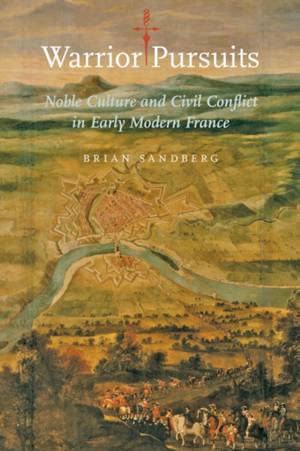
- Retrait gratuit dans votre magasin Club
- 7.000.000 titres dans notre catalogue
- Payer en toute sécurité
- Toujours un magasin près de chez vous
- Retrait gratuit dans votre magasin Club
- 7.000.0000 titres dans notre catalogue
- Payer en toute sécurité
- Toujours un magasin près de chez vous
Description
How did warrior nobles' practices of violence shape provincial society and the royal state in early seventeenth-century France?
Warrior nobles frequently armed themselves for civil war in southern France during the troubled early seventeenth century. These bellicose nobles' practices of violence shaped provincial society and the royal state in early modern France. The southern French provinces of Guyenne and Languedoc suffered almost continual religious strife and civil conflict between 1598 and 1635, providing an excellent case for investigating the dynamics of early modern civil violence. Warrior Pursuits constructs a cultural history of civil conflict, analyzing in detail how provincial nobles engaged in revolt and civil warfare during this period. Brian Sandberg's extensive archival research on noble families in these provinces reveals that violence continued to be a way of life for many French nobles, challenging previous scholarship that depicts a progressive "civilizing" of noble culture.
Sandberg argues that southern French nobles engaged in warrior pursuits--social and cultural practices of violence designed to raise personal military forces and to wage civil warfare in order to advance various political and religious goals. Close relationships between the profession of arms, the bonds of nobility, and the culture of revolt allowed nobles to regard their violent performances as "heroic gestures" and "beautiful warrior acts." Warrior nobles represented the key organizers of civil warfare in the early seventeenth century, orchestrating all aspects of the conduct of civil warfare--from recruitment to combat--according to their own understandings of their warrior pursuits.
Building on the work of Arlette Jouanna and other historians of the nobility, Sandberg provides new perspectives on noble culture, state development, and civil warfare in early modern France. French historians and scholars of the Reformation and the European Wars of Religion will find Warrior Pursuits engaging and insightful.
Spécifications
Parties prenantes
- Auteur(s) :
- Editeur:
Contenu
- Nombre de pages :
- 424
- Langue:
- Anglais
- Collection :
- Tome:
- n° 128
Caractéristiques
- EAN:
- 9781421423982
- Date de parution :
- 19-03-18
- Format:
- Livre broché
- Format numérique:
- Trade paperback (VS)
- Dimensions :
- 163 mm x 236 mm
- Poids :
- 498 g

Les avis
Nous publions uniquement les avis qui respectent les conditions requises. Consultez nos conditions pour les avis.






